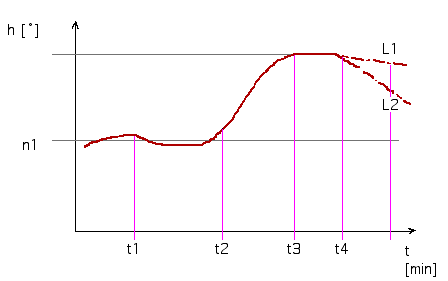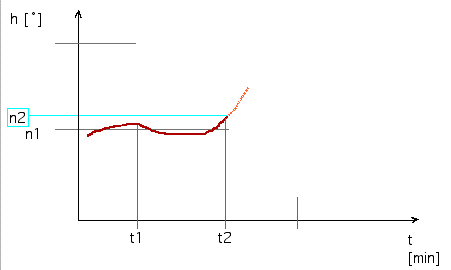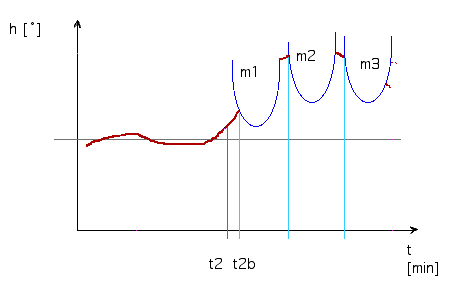
Edit OmarKN
bit.ly/_amie
عَنْ أَبِي هُرَيْرَةَ رَضِيَ اللهُ عَنْهُ أَنَّ رَجُلًا قَالَ لِلنَّبِيِّ صلى الله عليه و سلم أَوْصِنِي. قَالَ:
"لَا تَغْضَبْ، فَرَدَّدَ مِرَارًا، قَالَ: لَا تَغْضَبْ" .
[رَوَاهُ الْبُخَارِيُّ].
On the authority of Abu Hurayrah (may Allah be pleased with him):
"A man said to the Prophet: 'Give me advice.'
The Prophet, peace be upon him, said, 'Do not get angry.' The man asked repeatedly and the Prophet answered each time, 'Do not get angry.'”
Related by Bukhari & Muslim, audio see below.
Islamic definition: It is a destructive fire!
Prophetic hadith: “Anger is a burning coal ...” [3]

Therefore the consequence for whoever does not curb his anger is that he or she will sooner or later feel its evil consequences.
Anger is a destructive emotion, as a fire which destroys our well-being, consumes our good actions, repels our friends and dear ones, frightens our children and forces the angels to report bad actions for the Heavenly Records. This is a dangerous rough road and no-one is devoid of it and it brings one close to the wrath of Allah; story:
"What brings near the wrath of God?" He said: "Anger".
Yahya - peace be upon him- asked him:
"What thing grows and increases anger?"
Isa -peace be upon him- said:
"Pride, prestige, hope for honour and haughtiness." [5]
Someone could say: "How do I know that my anger is not justified, when I feel strongly about it, that in certain situations I do have the right to become angry?" (As an exception there are a few instances when it is good and allowed, such as in war when fighting the enemy, but not excessive anger.)
Answer: Yes, there are situations where anger is justified and lawful, as "in cases of religious affairs when one's honour is at stake. It is an effective preventive measure to safeguard the dignity of man. A person who has no anger is called a coward because he has got no true faith in Allah. The person fears creation and not the Creator." [2]
But certainly those instances are rare, and what is worse, for a beginner in anger management (AMI) it is difficult to distinguish between those situations from the outset. Later with some success in AMI, that will be easy.
We do not suggest that AMI means you never may get angry, for anger is not to be abolished but channelled, and the aim is always to reach your goal with other, reliable and sane methods, in shāh Allah. But to begin with, it is vital to bring it down to lower levels, to temper it, in order to take control over it.
For the time being you should be extremely suspicious about anger in which form or situation what-so-ever. Be warned against it!
Remember that the real strength of a man lies in controlling his wrath or anger.
In this respect the Islamic tradition is very clear:
It is reported in a hadith on the authority of Abu Huraira رضي الله عنه Allah be pleased with him, that Mohammad, the emissary of Allah ﷺ peace and blessings of Allah be upon him, said :
"The man is not a good wrestler; the strong man is in fact the person who controls himself at the time of anger." (Bukhari)
In another hadith Abu Hurairah رضي الله عنه (radiyallahu ʿanhu), reported that a man said to the Prophet ﷺ (sallallahu ʿalayhi wasallam): "Advise me!"
The Prophet said, "Do not become angry and furious."
The man asked (the same) again and again, and the Prophet ﷺ said in each case, "Do not become angry and furious."
[Al-Bukhari; Vol. 8 No. 137] (see hadith in Arabic at top of page.)
Commenting on this hadith Al-Nawawī says that "he meant to not allow anger to lord over oneself and cause the loss of one's comportment." Instead to control your anger and never lose control. [11]
In this context there is the Gabriel-hadith on excellence (ihsān) in Islam (as part of a longer hadith[13]):
A man asked the Messenger of Allah ﷺ : "Then tell me about Ihsan." He said:
"It is to worship Allah as though you are seeing Him,
and while you see Him not yet — truly He sees you."
Also in the Quran we are constantly reminded that Allah sees and hears us, thus watching over us all the time. Knowing this how can anyone be so carried away by his (her) passions – and devoid of godfearingness (taqwā) to behave like an ugly, crazy person, chasing around and abusing people?
It becomes clear then that in reality anger is a secret disease, like for example alcoholism, which has to be treated just like any other disease, and it is you yourself who has to take the decisive step to curb it, with Allah's help.
In this context it is important to remember that AMI is part of a comprehensive treatment of the heart, not isolated methods.
Therefore come to terms with yourself (nafs) and see your propensity toward the anger-syndrome!
To start with ask yourself the following questions:

AMI has to intervene here as soon as possible, as shown in line graph d2 below.
graph - d2:

This is the case of a person who is able to remind him-/herself at this critical moment (t2) of his standing in front of Allah (swt), and that he will have to answer Him at That Day Of Balancing for everything he has done and neglected to do, or what he has said, the good of it and the bad.
b) The second cure curbing the tension of temper-build-up altogether is described in graph d3:
With given, innate levels of passion and emotion the response to anger will vary from person to person, and also from young age to mature age. Other factors also determine levels of tension generally, such as the person's living and working conditions, etc.
For some persons it may not be possible to prevent a strong, swelling attack of anger at the outset (as described in d2) because of the above reasons, and it is very difficult especially when he /she has not internalized the Islamic viewpoint [see ch. 8] that whatever happens is because Allah (swt) has allowed it to happen.
Therefore they are in dire need of implementing the three most important Islamic methods of anger management:
graph - d3:

Here there is very little time left to stop the process, the longer one is inactive not calling upon Allah (swt) the harder it will be to stop it. When the person realizes that he is without power to counter this satanic anger attack, he should seek refuge with Allah Almighty and utter the words of protection. (see chapters 6 & 7b).
This is the first method of AMI (m1). If he needs more input and he probably will, he should use method2 (m2) and method3 (m3). There is no way he cannot to succeed in this if he is sincere.
(m1) saying the word of protection:
aʿūdhū billāhi min ash-shaytān ir rajīm
(m2) changing bodily posture:
when angry, sit down if standing — and lie down if sitting.
(m3) washing the face etc, arms, hands:
make ablution with water. (see ch. 7b)
(1) The first medicine of knowledge is to think over the rewards of appeasing anger, that have come from the verses of the Quran and the sayings of the Prophet ﷺ. Your hope for getting rewards of appeasing anger will restrain you from taking revenge.
(2) The second kind of medicine based on knowledge is to fear the punishment of God and to think that the punishment of God upon me is greater than my punishment upon him. If I take revenge upon this man for anger, God will take revenge upon me on the Judgement Day.
(3) The third kind of medicine of anger based on knowledge is to take precaution about punishment of enemity and revenge on himself. You feel joy in having your enemy in your presence in his sorrows, You yourself are not free from that danger. You will fear that your enemy might take revenge against you in this world and in the next.
(4) Another kind of medicine based on knowledge is to think about the ugly face of the angry man, which is just like that of the ferocious beast. He who appeases anger looks like a sober and learned man.
(5) The fifth kind of medicine based on knowledge is to think that the devil will advise by saying: " You will be weak if you do not get angry!" Do not listen to him!
(6) The sixth reason is to think: " What reason have I got to get angry? What Allah wishes has occured!"
7b. The medicine based on action is of three kinds:
(m1) When you get angry, say: I seek refuge in God from the accursed evil (aʿūdhū billāhi min ash-shaytān ir rajīm). The Prophet ﷺ ordered us to say thus.
When Ayesha (ra) got angry, he dragged her by the nose and said:
"O dear Ayesha, say: O God, you are the Lord of my prophet Muhammad,
forgive my sins and remove the anger from my heart and save me from
misguidance."
(m2) If anger does not go away by those means, you will sit down if you are standing, lie down if you are sitting, and come near to earth, as you have been created of earth. Thus make yourself calm like the earth. The cause of wrath is heat and its opposite is to lie down on the ground and to make the body calm and cool.
The Prophet ﷺ said: Anger is a burning coal. Don't you see your eyebrows wide and eyes reddish? So when one of you feels angry, let him sit down if standing, and lie down if sitting.
(m3) If still anger does not stop, make ablution with cold water or take a bath, as fire cannot be extinguished without water.
The Prophet ﷺ said : "When one of you gets angry, let him make ablution with water as anger arises out of fire."
In another
narration, he said: "Anger comes from the devil and the devil is made
of fire." [5]
For these methods or ways to become reality one has to come to forbearance and humility in all cases. This is especially clear when the issue is not to uphold the dīn (religion) of Islam, but the problem is from our expectations of the dunya or of other people.
And if the defense of Islam is at stake, one must still not rush towards action under the pressure of anger, but one has to excuse oneself, first calm down and stick to what Imam Al-Ghazalī's advised the Muslims [12], who stated that anger "is acceptable only a the right time, in the right place, for the right reasons, and with the right intensity." [23]
When one has internalized the Islamic viewpoint that whatever happens is because Allah (swt) has allowed it to happen and then also by knowing oneself, one can strive to rid oneself from selfcenteredness and egotism, for in the words of S. Ahmad Zarrūq, "people are filled with themselves".
With the help of Allah, one will be able to let go of what ultimately is beyond our restriced, illusory domain of power, and arrive step-by-step at a control of one's anger by understanding the rule of "the right time, in the right place, for the right reasons, and with the right intensity."
With the whole effectiveness and barakah (heavenly powers) of the Islamic way - living Islam -, one will by Allah's leave (bi-idhni-LLah) win over this nafs ( an-nafs al-ammara bi-ssu' ) [26] - this soul commanding us to do evil - and taste the sweet taste of victory over one's worst enemy.
To become aware of oneself is a step towards knowing oneself, and according to a famous saying in Islam, whoever knows himself he knows his Lord. [27]
After ʿAli ![]() subdued him and sat on his chest with the intention of killing him, the man spat on his face. ʿAli
subdued him and sat on his chest with the intention of killing him, the man spat on his face. ʿAli ![]() at once let him go.
at once let him go.
The man was amazed and said, "You should have become even more angry due to my spitting at you and should have hastened in killing me. Why did you spare me?"
ʿAli ![]() replied, "Due to this action of yours my nafs became involved and my intention did not remain purely for the sake of Allah."
replied, "Due to this action of yours my nafs became involved and my intention did not remain purely for the sake of Allah."
The light of sincerity had such a cleansing effect that it purged the impurities and kufr of the disbeliever's heart, and he recited the kalima (profession of faith) at once, and became Muslim. [28]
Allah Most High says:
{ And those who control/ restrain anger (restrain their rage) and who forgive people, Allah loves the righteous } (Quran 3:134).
The Messenger of Allah ﷺ Allah bless him and give him peace) said:
Do not become angry (Bukhari).
and
A strong man is not one who defeats (another) in physical combat. Verily, a strong man is he who controls his self at the time of anger (Bukhari Muslim).
In another narration it is said that a strong man is he who controls anger. It is essential to keep anger under control. One should never act spontaneously in accordance with the dictates of anger. On the contrary, anger should be made subservient to the commands of the Shariah.
It is natural to be aroused in the state of anger. Such natural propensity is not blameworthy (in itself). But Allah Most High has endowed man with willpower. Anger has therefore to be controlled since it is within the scope of man's willpower to do so. Failure to exercise this volitional power is contrary to human nature.
There are many reasons for the inclusion of anger in the natural attributes
of man. Along with the quality of anger, Allah Most High has endowed man
with the ability to control such anger to ensure that it is not misdirected and
unjustly employed. Anger in itself arises involuntarily. It is automatically
activated. But acting in accordance with its demand is voluntary; hence,
refraining from it is likewise voluntary. The remedy for a non-volitional act
(the way of curbing it) is nothing other than the exercise of one's willpower in order to bring about restraint and control...
... [29]
2 Anger and Islam < islamawareness.net >
3 hadith in chapter 7
4 a swelling mass of emotion: PHM**
5 The Causes of Anger and It's Medicine,
Abu Hamid Al-Ghazali - Poems by the Famous Poet [They write "poetry", but it's prose.]
11 Instead to control your anger and never lose control. [fn 103] PHM103
13 Gabriel-hadith: link
18 There is a saying of Imam `Ali (kAw) in this respect, which we were
unable to trace. Another one of his sayings is < here >.
26 see: The Meaning of Nafs by Muhammad 'Afifi al-'Akiti < nafs.html >
27 a famous saying: < khkr_e.html >
28 chapter 9 is from: < muslim-canada.org >
29 This is the first part of the chapter on anger; The Path to Perfection, Sh Masihullah Khan; PTP59/60
30 The soul in its lowest degree is the ego, as egotism, this is the (nafs) which orders man/ woman to evil - first to oneself, then to others and the creatures of world. See The Meaning of Nafs
** PHM: Purification of the Heart; Signs, Symptoms and Cures of the Spiritual Diseases of The Heart, Transl. and Comm. of Imam al-Mawlud's Matharat al-Qulub, by Hamza Yusuf; Starlatch Press 2004
Anger Management: An Islamic perspective:
Cures for Anger from the Sunnah


Related texts
![]() The Meaning of Nafs
The Meaning of Nafs
![]() Controlling Anger - YouTube
Controlling Anger - YouTube